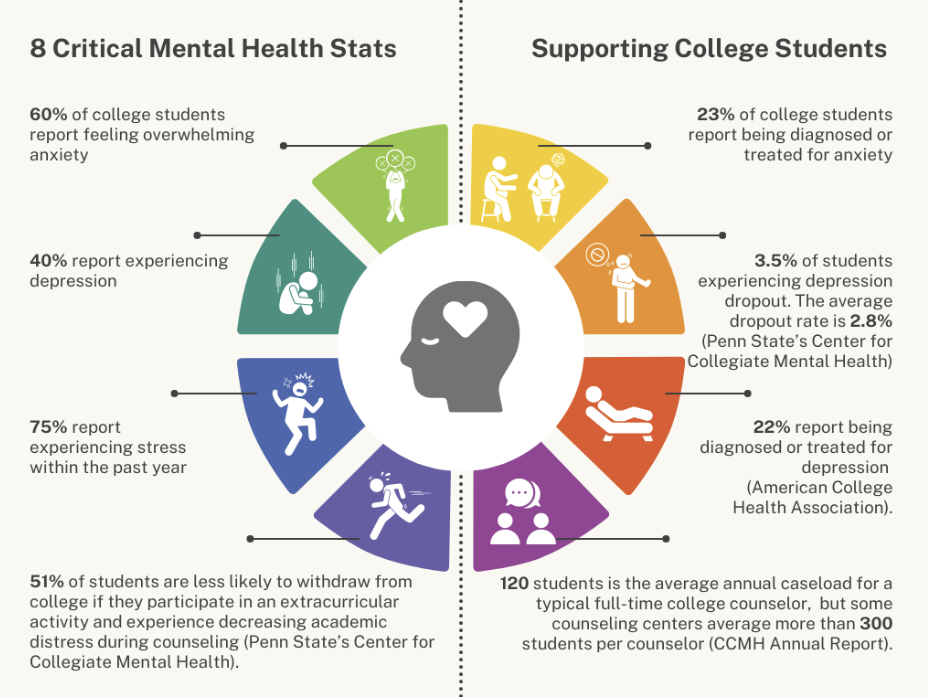College is a whirlwind of new experiences, academic and social pressure, family expectations, adjustment to new found independence, and pre-existing or new mental health challenges. The diagram below shows eight critical mental health statistics affecting college students.

Source: Innovative Educators
College is a whirlwind of new experiences, academic and social pressure, family expectations, adjustment to new found independence, and pre-existing or new mental health challenges. The diagram below shows eight critical mental health statistics affecting college students.
As a student of color, this journey can be especially complex as you balance cultural identity and social expectations with the academic demands.
Nonetheless, you are not alone. There are resources on campus and in the community for you to navigate this path and successfully meet your goals for college.
Understanding Your Unique Experience As BIPOC College Students
Being a student of color brings a unique perspective to college life. You might have to juggle academic demands with the pressures of representing your culture or navigating stereotypes. It’s important to acknowledge these challenges and cope in a healthy way, so you do not become overwhelmed. Healthy ways to cope can include:
- Validating your feelings: It’s okay to feel overwhelmed, stressed, or lonely. Your emotions are valid.
- Building a support system: Surround yourself with people who understand, support, and uplift you.
- Practicing self-compassion: Be kind to yourself and avoid self-criticism. Instead of only focusing on the areas you are struggling in, take a moment to remember the areas you are excelling.
- Finding your community: Form connections with other students of color and organizations on campus that share experiences and offer support.
Balancing Act: Academics and Identity
College is about more than just grades. It’s about discovering yourself and your place in the world. Finding a balance between academic success and your identity as a young adult is key.
- Set realistic goals: Break down big assignments into smaller steps.
- Time management: Create a schedule that works for you, including study time, social activities, and self-care.
- Embrace your culture: Explore your heritage through clubs, events, or personal projects.
- Find mentors: Seek guidance from professors, advisors, or older students who understand your experience.
Building Your Support Network
A strong support system can make all the difference. Surround yourself with people who uplift and encourage you.
- Connect with your community: Join cultural clubs or organizations on campus.
- Make friends: Build relationships with people from different backgrounds.
- Find a mentor: Seek guidance from someone who inspires you.
- Online communities: Connect with other students of color through social media or online forums.
Overcoming Challenges
College is full of ups and downs. It’s okay to face challenges, but it’s important to develop strategies to overcome them.
- Identify your challenges: Pinpoint the specific areas causing stress.
- Develop coping mechanisms: Find healthy ways to manage stress, like talking to a friend or exercising.
- Seek support: Don’t be afraid to ask for help from professors, advisors, or counselors.
- Learn from setbacks: View challenges as opportunities for growth.
Celebrating Your Successes
It’s important to recognize your achievements, no matter how small. Celebrate your successes and reward yourself for your hard work.
- Set goals: Break down large goals into smaller, achievable steps. Ensure you set S.M.A.R.T goals. That is, make specific, measurable, achievable, relevant, and time sensitive goals.
- Track your progress: Keep a journal or use a planner to monitor your accomplishments and progress towards your goals.
- Reward yourself: Treat yourself to something special when you reach a milestone.
- Share your successes: Tell others about your achievements to boost your confidence.
Remember, your time in college is a marathon, not a sprint.
It’s okay to take your time, make mistakes, and learn from your experiences. If you need to, you can even request accommodations or take leave. By prioritizing your mental health, building a strong support system, and celebrating your successes, you’ll create a fulfilling and rewarding college experience.


